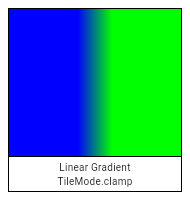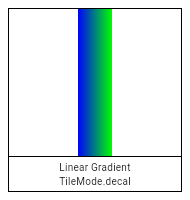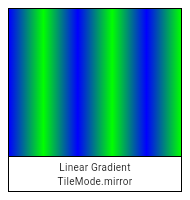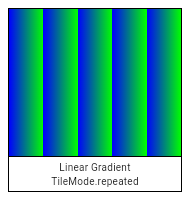Gradient.linear constructor
Creates a linear gradient from from to to.
If colorStops is provided, colorStops[i] is a number from 0.0 to 1.0
that specifies where color[i] begins in the gradient. If colorStops is
not provided, then only two stops, at 0.0 and 1.0, are implied (and
color must therefore only have two entries). Stop values less than 0.0
will be rounded up to 0.0 and stop values greater than 1.0 will be rounded
down to 1.0. Each stop value must be greater than or equal to the previous
stop value. Stop values that do not meet this criteria will be rounded up
to the previous stop value.
The behavior before from and after to is described by the tileMode
argument. For details, see the TileMode enum.




If from, to, colors, or tileMode are null, or if colors or
colorStops contain null values, this constructor will throw a
NoSuchMethodError.
If matrix4 is provided, the gradient fill will be transformed by the
specified 4x4 matrix relative to the local coordinate system. matrix4 must
be a column-major matrix packed into a list of 16 values.
Implementation
Gradient.linear(
Offset from,
Offset to,
List<Color> colors, [
List<double>? colorStops,
TileMode tileMode = TileMode.clamp,
Float64List? matrix4,
]) : assert(_offsetIsValid(from)),
assert(_offsetIsValid(to)),
assert(matrix4 == null || _matrix4IsValid(matrix4)),
super._() {
_validateColorStops(colors, colorStops);
final Float32List endPointsBuffer = _encodeTwoPoints(from, to);
final Float32List colorsBuffer = _encodeWideColorList(colors);
final Float32List? colorStopsBuffer = colorStops == null
? null
: Float32List.fromList(colorStops);
_constructor();
_initLinear(endPointsBuffer, colorsBuffer, colorStopsBuffer, tileMode.index, matrix4);
}